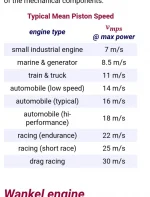Flyingdutchman
Thread starter
Yes i was also wondering if there is a possibilty to mount an oil temp sensor which can communicate with the ecu and a gauge but there is no real good location for it.I was thinking the same, i am owing a Honda S2000 with the F20C engine. 9.000 RPM, high piston speed.
For this engine Honda reccomends also 10w-30 or 5w-40. The later one surprisingly for winter, below freezing point. (??)
There are reports that the S2000 engine has a higher then average Oil temperature. I dont know it.
It is correct in my opinion that you try to select a oil based on the bearing clearances. If you use -30 oil look for a oil with a HTHS over 3.5 for this high reving engines. I decided to try a thin -40 oil as best compromise and ended up using Shell Helix Ultra 5w-40. This oil is based on GTL and has a viscositiy of 12.9, it is on the borderline to a -30 Oil. It carrys a lot of good approvals.
So far, the engine runs great. It has oil consumption, i maybe try a different oil, but so far i am satisfied with it.
Do short OCIs and change the oil often because of the high piston speed and maybe high oil temperatrues.
Because of the high piston speeds and RPMs i am a little bit hesitant about the use of 0w-40 in these engines.I am concernd that this oils shear quickly.
BTW, in the german S2000 Forum some "Experts" try to convince people to use 5w-50 oil. This year where 2 damaged engines reported, both engines sufferd rod bearing failure after hard use on the autobahn. Both engiens where filled with 5w-50 oil
I was always told that high rpm engines need thin oil to cope with the high rotational forces and prevent cavitation/starvation and better cooling.
I even heard stories that the 20k rpm motogp and old f1 uses 8w oil.
I am assuming that this is what happend with the s2000s on the german forum just like the stories with the bmw m v8 and v10 on 10w60.
It always nice to see that people on a forum know it better than Honda as one of the worlds largest car and motorcycle manufacturer with numerous decades of formule 1, indycar, motogp and world super bike experience/championships
We are also currently running the same shell helix 5w40 gtl oil as you do so we will probably stick with it, nice to hear that you have good results with it in a similiar engine. Oil consumption is normal just by design of the Honda engines.
Funny is that the shell helix ultra 5w40 is also ferrari oem recomended for their n/a v8 and v12s. Which in terms of performance are pretty similiar.
I am aware of ato24, i buy Ravenol from them.


